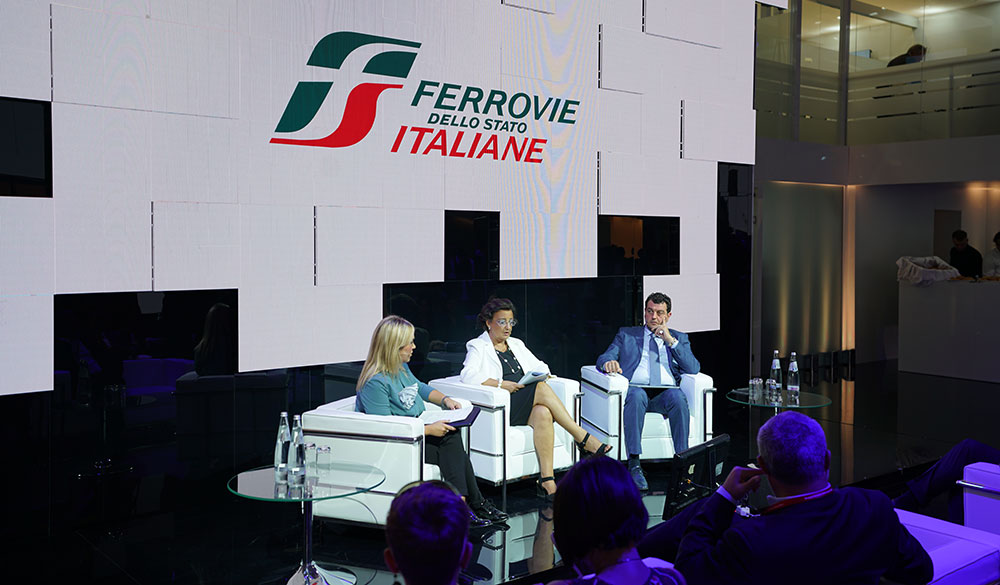Improving train journeys for people and goods

Berlin, 19 September 2018
New Trenitalia regional trains, greater punctuality, and more comfort for people traveling by train for work, study, personal needs, or tourism; sustainable mobility and modal integration of Busitalia, but also high speed and smart train freight services for Mercitalia.
These are the topics tackled today at the Passenger and freight transport round table held at the world railway fair InnoTrans 2018 in Berlin, during which the actions of the FS Italiane Group were detailed, more hard-hitting in the upcoming months, to improve the travel of people and goods and to transfer more and more traffic from roads to railways.
People at the centre of Trenitalia's strategies: new regional trains, more punctuality and more comfort for commuters
The arrival of the new Rock and Pop trains allows Trenitalia (FS Italiane Group) to renew its entire regional fleet to improve journeys for people who choose to travel by train every day.
An economic investment of 4.2 billion euros for the supply of 517 new Rock and Pop trains, which for the sheer number of trains and economic value is unprecedented in Italy. An investment that, added to the other trains, rises to about 6 billion euros for over 600 new trains.
Rock and Pop are snappier, more comfortable, and more sustainable, but also more accessible to people with reduced mobility and/or disabilities. Designed for commuters and for the needs of Trenitalia staff, these new trains represent a generational leap compared to those currently in service in Italy and will lead to, within five years, a renewal of 80 percent of the regional fleet. Before arriving at InnoTrans 2018, the first Rock and the first Pop trains came from the Hitachi factories of Pistoia and Alstom of Savigliano respectively, and concluded their technical-dynamic tests on the special Velim railway circuit (Czech Republic) equipped with special technology, trials and tests necessary for the approval of each new train before entered into service. Rock and Pop are destined to revolutionise the commuter travel experience and were born to develop and support a new way of travelling that encourages train mobility.
Busitalia: a fleet for sustainable mobility and modal integration
Busitalia's commitment (Gruppo FS Italiane) to aiming for greater sustainable mobility has shifted its attention and investments towards alternative and more sustainable traction technologies with the progressive introduction of electric and hybrid buses. The reference market is the Italian market where Busitalia develops TPL services in Tuscany, Veneto, Umbria, and Campania. The Busitalia fleet in Italy already has 23 electric buses, of which 16 in Florence and seven in Umbria, to which, by the end of 2018, another four electric buses for Padua and 30 hybrid buses for Florence will be added. More significant is the commitment for 2019 with the arrival of another 12 electric buses in Umbria and Veneto and 50 hybrids in Florence. This will consist of an "ecological" fleet that will amount to about 120 buses. In order to promote sustainable mobility in Italy, Busitalia has launched a substantial fleet renewal plan that has taken the form of the purchase of 800 new generation diesel oil buses (Euro VI), of which 390 already in 2018.
Busitalia is also represented in the Dutch market through its subsidiary QBuzz, the third operator of TPL in the Netherlands that manages the services in the basins of Utrecht and Gronigen-Drenthe where it recently won a tender for the assignment of the service for another 10 years and, from December 2018, will also be represented in the Drechtsteden and Alblasserwaard en Vijfheerenlanden (DAV) area, between Utrecht and Rotterdam.
The modal integration of Busitalia plays a central role in facilitating the use of combined transport and modal interchange between urban and extra-urban rail/road transport services. Modal integration models applied in Umbria and Tuscany demonstrate the best of the best in Italy.
Mercitalia: new era in freight transport, from high-speed services to the "Smart Train" Busitalia: a fleet for sustainable mobility and modal integration
With the birth of Polo Mercitalia, the FS Italiane Group's freight business has entered a new era. The actions put in place by Mercitalia in the past two years have allowed FS Italiane to reposition itself in the freight and logistics market, creating the largest Italian player in the sector and significantly improving the economic and financial performance of its business. The transformation path is not yet complete and the challenges that Mercitalia will have to face in the coming months are still many. Nonetheless, the rapid launch of its ambitious investment plan, together with strong products and process innovation strategies being implemented by Mercitalia, are creating the best conditions for all pre-set objectives to be achieved.
Soon, for example, on the Bologna-Caserta line, Mercitalia Fast will debut, the first high-speed rail transport service dedicated to goods. In addition, Mercitalia is working on the development of the smart train, an innovative project that will allow the creation of freight trains composed of "intelligent" cars that can "converse" in real time with the locomotive, ensuring significant improvements in terms of operational efficiency, customer service, and operational safety, compared to current trains.